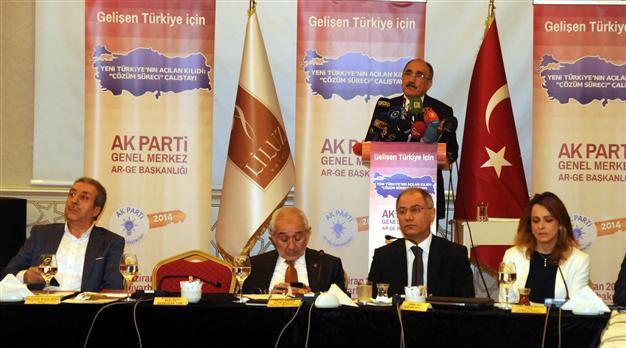Turkish government plans legal steps in Kurdish peace bid
Turan Yılmaz / Faruk Balıkçı DİYARBAKIR

Deputy PM Beşir Atalay speaks during a workshop on the Kurdish peace process held in Diyarbakır, June 6. DHA Photo
The Turkish government is prepared to take a “courageous step” in the Kurdish peace process, including passing legal amendments for a new roadmap, Deputy PM Beşir Atalay told a workshop on the peace process held in Diyarbakır on June 6.“Legal amendments will be done if necessary. They will be taken to the Parliament. We have to have a solution,” said Atalay, adding that they would also consider introducing a right of return for outlawed Kurdistan Workers’ Party (PKK) militants, or enabling their return to politics.
“We have made the state face what it has done in the past. We have brought all the wrongdoings, injustices, bans, taboos and unresolved murders to light once again,” said Atalay, adding that the absence of international mediators in the peace process had been another problem.
“The solutions to the big problems always come with difficulty. Even the lack of an international mediator has become a problem. But we have always carried out this process with courage and self-confidence,” Atalay said.
The deputy prime minister also said they agreed with the latest message from PKK leader Abdullah Öcalan, in which he said a new stage in the peace process had started and that hopes should be preserved and improved.
On June 1, Peoples’ Democratic Party (HDP) deputy leader Sırrı Süreyya Önder, along with HDP deputy parliamentary heads İdris Baluken and Pervin Buldan, met with Öcalan at the İmralı Island prison, where he is serving a life sentence.
Öcalan called on both sides to “avoid any attitudes that might harm the process,” adding that they “should focus on methods that will put into practice the sincere and realistic proposals for this beginning.”
Öcalan’s remarks came at a time when tensions are heating up in the country’s southeast, where no serious encounter has occurred between PKK militants and Turkish security forces since March 2013 when the PKK declared a cease-fire.
The recent clashes between the state and PKK sympathizers in Diyarbakır’s Lice district and protests held by families who claim that their children have been abducted or persuaded to join the PKK has increased the tension in the region.
The government and the HDP are engaged in a rift over children allegedly kidnapped by the PKK, and the prime minister has called on the HDP to mediate with the PKK for the return of the children.
“If they won’t do this, if they are courageous enough to do so, it’s better for them to say so,” Prime Minister Recep Tayyip Erdoğan said June 3 in his parliamentary group meeting. Erdoğan repeated that the government had a Plan B and Plan C on the issue but underlined that they wanted the HDP to resolve the problem.
“Otherwise we have other methods,” Erdoğan said without detailing what these methods could be.
Selahattin Demirtaş, co-leader of the Peace and Democracy Party (BDP), meanwhile, said June 3 that the families protesting in Diyarbakır were being paid by the intelligence organization to do so and that the children had voluntarily joined the PKK.
Meanwhile, Demirtaş said on June 6 that they had delivered the families’ demand to return of their children to Kurdistan Communities Union (KCK) officials a day after the protests started. “Our initiatives in this respect are continuing. I have never said the families whose children [joined the PKK] were paid,” said Demirtaş also adding that they would not be scared by the prime minister’s statements.
Meanwhile, Interior Minister Efkan Ala, Agriculture Minister Mehdi Eker, ruling Justice and Development Party (AKP) deputy chair Ekrem Erdem, AKP parliamentary deputy group head Ahmet Aydın, Democratic Society Congress (DTK) Secretary General Seydi Fırat, scholars, politicians and NGOs also attended the workshop held at the Liluz Hotel in Diyarbakır. Representatives from the HDP and BDP were absent from the workshop.
















